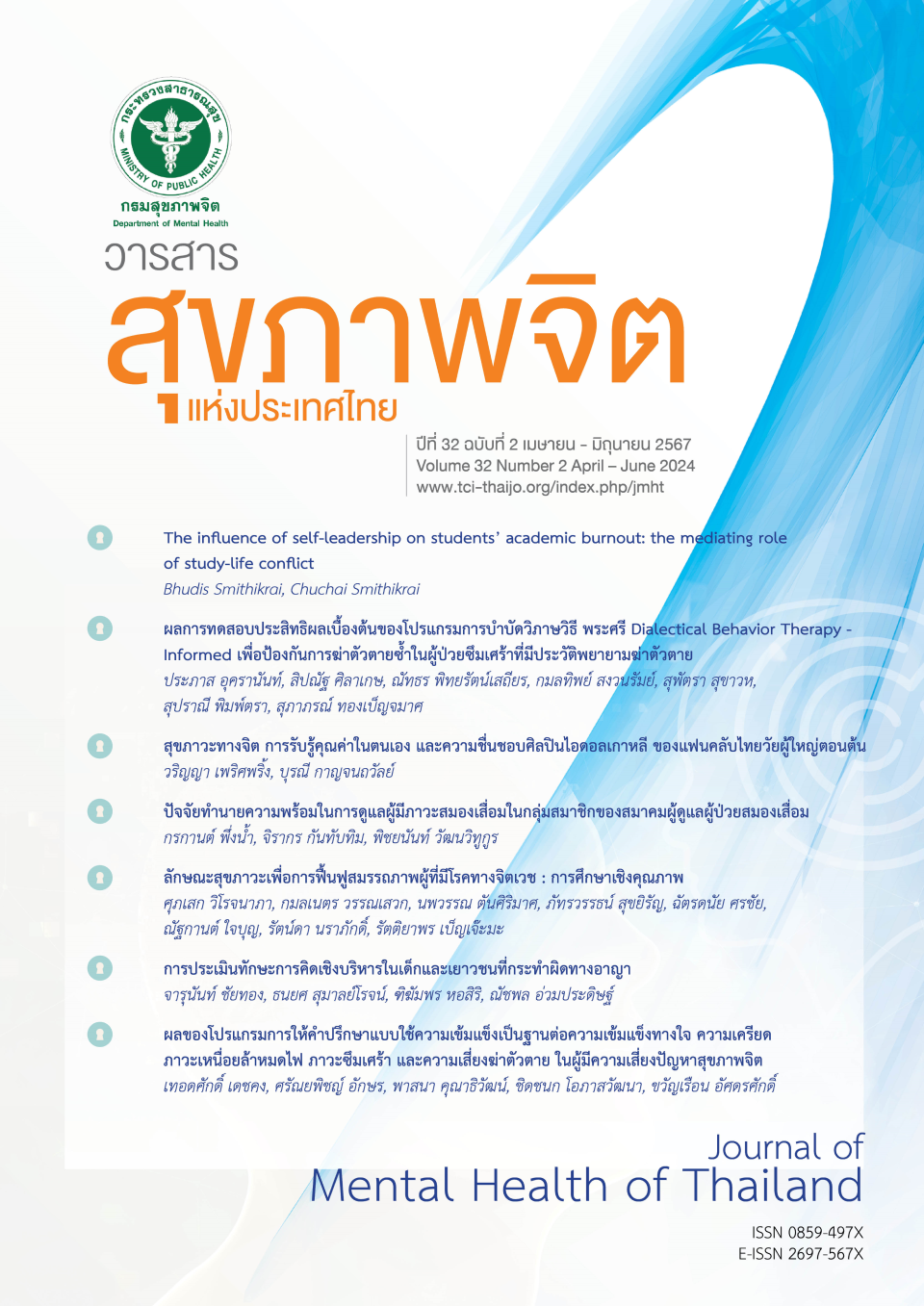Effects of a strength-based counseling program on resilience, stress, burnout, depression, and suicide risk in people at risk for mental health problems
Keywords:
mental health problems, resilience, strength-based counselingAbstract
Objective: To compare resilience and mental health problems between individuals at risk for mental health problems who received strength-based counseling (SBC) and psychological first aid (PFA).
Methods: Secondary data from counseling records of individuals at risk for mental health problems within the regular service system in the Health Region 9 from May to September 2016 were used. Demographics, resilience quotient, stress, burnout, depression, suicide risk, and type of counseling were extracted. Resilience and mental health problem scores were compared before and after receiving counseling, using the paired t-test, and between those who received SBC and PFA, using the independent t-test. Pre-post changes in scores between both groups were compared using the independent t-test.
Results: The individuals who received SBC (n = 141) had a mean age of 41.1 years (SD = 16.3) while those who received PFA (n = 47) had a mean age of 22.1 years (SD = 5.8). The SBC group exhibited significantly higher level of resilience and significantly lower burnout, stress, depression, and suicide risk scores after counseling compared to before counseling. Moreover, the SBC group showed significantly larger changes in resilience, depression, and suicide risk scores compared to the PFA group. However, there was no significant difference in the change in burnout and stress scores between both groups.
Conclusion: SBC tends to yield positive effects on levels of resilience and mental health for individuals at risk for mental health problems. Compared to such a conventional approach as PFA, SBC has a tendency for better outcomes in terms of improvement in resilience, depression, and suicide risk.
Downloads
References
Institute for Economics & Peace. Global peace index 2022: measuring peace in a complex world [Internet]. Sydney: Institute for Economics & Peace; 2022 [cited 2023 June 23]. Available from: https://www.visionofhumanity.org/wp-content/uploads/2022/06/GPI-2022-web.pdf
Strategy and Planning Division, Office of the Permanent Secretary Ministry of Public Health. Public health statistics A.D. 2022 [Internet]. Nonthaburi: Office of the Permanent Secretary Ministry of Public Health; 2022 [cited 2023 May 2]. Available from: https://spd.moph.go.th/wp-content/uploads/2023/11/Hstatistic65.pdf
Institute for Population and Social Research Mahidol University. Thai health 2022: the Thai family & COVID-19. Bangkok: Amarin Corporations Public Co.,Ltd.; 2022 [cited 2023 May 2]. Available from: https://www.hiso.or.th/thaihealthstat/report/thaihealth.php?y=2022&l=thai
Panyayong B. Handbook of psychological first aid for people with mental health problems. Nonthaburi: Department of Mental Health; 2019.
Detkong T. Strength-based counseling approach for risk mental health groups. 1st. Nonthaburi: Department of Mental Health; 2023.
Detkong T. Effects of a motivational interviewing program on blood glucose levels control for patient with type 2 diabetes mellitus patients. Journal of Bamrasnaradura Infectious Diseases Institute. 2020;14(3):134-45.
Grotberg HE. A guide to promoting resilience in children: strengthening the human spirit (early childhood development: practice and reflection no. 8). The Hgne: Bernard van Leer Foundation; 1995.
Detkong T, Gunadhivadhana P, Tipchot T, Wuttiharn P. Reliability and validity of resilience inventory 3-item version. Journal of Mental Health of Thailand. 2022;30(4):297-306.
Detkong T, Aksorn S, Gunadhivadhana P, Assadonsak K, Tipchot T. Correlation between the resilience inventory 3-item version and screening of mental health problems by age group. Journal of Mental Health of Thailand. 2023;31:52-63.
Tepklang C. The development of elderly depression surveillance and caring system in out patient department of Ubonratana hospital, KhonKaen province. Mahasarakham Hospital Journal. 2019;16(1):70-7.
Silapakit O. Srithanya stress scale. Journal of Mental Health of Thailand. 2008;16:177-85.
Bureau of Mental Health Academic Affairs, Department of Mental Health. Preliminary report on developing a burnout assessment tool to present to the mental health check-in steering committee. Nonthaburi: Department of Mental Health; 2023.
Maslach C, Jackson SE, Leiter MP. Maslach burnout inventory manual (3rd ed). Palo Alto: Consulting Psychologists Press; 1996.
Peterson C, Seligman MEP. Character strengths and virtues: a handbook and classification. Oxford: American Psychological Association; 2004.
Seligman M. Learn optimism. New York: Simon & Schuster; 1998.
Nakprom S, Noosorn N, Maneerat S. The effect of psychological resilience enhancement program on reducing burnout in the elderly care for elderly caregivers in Sawang Arom district, Uthai Thani province. Journal of Phrapokklao Nursing College, Chanthaburi. 2022;33(1):224-38.
Suranata KS, Atmoko A, Hidayah N. Enhancing students' resilience: comparing the effect of cognitive-behavior and strengths-based counseling. License. 2017;134:102-8. doi:10.2991/icirad-17.2017.20.
Bureau Of Mental Health Academic Affairs, Department of Mental Health. Report on opinions of strength-based counselors. Nonthaburi: Department of Mental Health; 2023.
Darbani SA, Parsakia K. The effectiveness of strength-based counseling on the reduction of divorced women's depression. Journal of Assessment and Research in Applied Counseling. 2022;4(1):28-32. doi:10.52547/jarac.4.2.64.
Sharei A, Ebrahimi M, Ochtapeh PA, Mahdavirad H, Miyanroudi FJ. the effectiveness of strength-based therapy in improving self-esteem and reducing suicidal thoughts of women affected by domestic violence in Ardebil. Journal of Preventive Counseling. 2023;4(1):31-44. doi:10.22098/jpc.2023.12715.1166.
Shoukr EMM, Mohamed AAE, El-Ashry AM, Mohsen HA. Effect of psychological first aid program on stress level and psychological well-being among caregivers of older adults with alzheimer's disease. BMC Nurs. 2022;21(1):275. doi:10.1186/s12912-022-01049-z.
Cheaplamp S, Dangdomyouth P. Burnout syndrome. Royal Thai Air Force Medical Gazette. 2020;66(2):44-52.
Downloads
Published
How to Cite
Issue
Section
License
Copyright (c) 2024 Journal of Mental Health of Thailand

This work is licensed under a Creative Commons Attribution-NonCommercial-NoDerivatives 4.0 International License.
- Authorization to photocopy items for internal or personal use of specific clients, is granted. The consent does not extend to other kinds of copying, such as for general distribution, for advertising, or for resale.
- Unless otherwise states, the views and opinion expressed in Journal of Mental Health of Thailand are those of authors of the papers, and do not represent those of the editorial board or the Department of Mental Health.




